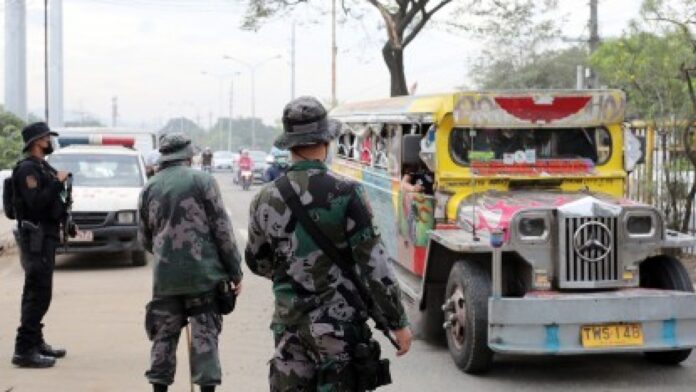Metro Manila will remain under modified enhanced community quarantine (MECQ), the second strictest quarantine classification level, until September 7, Malacañang announced on Saturday.
“The Inter-Agency Task Force (for the Management of Emerging Infectious Diseases or IATF-EID) retained the modified enhanced community quarantine status of the National Capital Region,” Presidential Spokesperson Harry Roque said in a press statement.
Apart from Metro Manila, the nearby provinces of Bulacan, Cavite, Laguna, and Rizal will also stay under MECQ, said Roque, who concurrently serves as IATF-EID spokesperson.
The MECQ implementation will also be continued in Bataan, Apayao, Ilocos Norte, Lucena City, and Aklan, he said, adding that Iloilo province and its highly-urbanized city, as well as the cities of Lapu-Lapu, Cebu, Mandaue, and Cagayan de Oro, would also remain under MECQ.
Roque said “added restrictions” on dining, personal care services, and religious activities would be imposed in Metro Manila, Bataan, and Laguna.
On the other hand, the general community quarantine (GCQ) status “with heightened restrictions” has also been retained in Ilocos Sur, Cagayan, Quezon, Batangas, Naga City, Antique, Bacolod City, and Capiz, he said.
Roque said Cebu province, Negros Oriental, Zamboanga del Sur, Misamis Oriental, Davao City, Davao del Norte, Davao Occidental, Davao de Oro, and Butuan City would also stay under the more restrictive GCQ.
On the other hand, the GCQ classification without restrictions will be implemented anew in Baguio City, Santiago City, Quirino, Isabela, Nueva Vizcaya, Tarlac, Puerto Princesa, Guimaras, Negros Occidental, Zamboanga Sibugay, Zamboanga City, Zamboanga del Norte, Davao Oriental, Davao del Sur, General Santos City, Sultan Kudarat, Sarangani, North Cotabato, and South Cotabato.
Agusan del Norte, Agusan del Sur, Surigao del Norte, Surigao del Sur, Dinagat Islands, and Cotabato City will also stay under the regular GCQ, he said.
The new quarantine classifications will lapse on September 7, Roque said.
“This latest community quarantine classification shall take effect beginning Sept. 1 until Sept. 7, 2021, pending a change in community quarantine guidelines,” he said.
Brace for shift to granular lockdowns
Meanwhile, the Philippine National Police (PNP) has directed police commanders to start preparing for the possible shift to granular lockdowns.
“I have tasked police commanders to start coordinating with local government officials and initiate discussions regarding the possible implementation of granular lockdown starting next month. Ito ay isang proposal pa lamang subalit mas maigi nang paghandaan ito ng maaga upang hindi na magdulot ng kalituhan na maaring mauwi sa hindi pagkakaunawaan kung sakaling ma-aprubahan ito (This is just a proposal for now but it would be better to prepare ahead to avoid confusion, which may result in misunderstanding, in case it is approved),” PNP Chief, Gen. Guillermo Eleazar, said in a statement.
He said the police and barangay officials should work hand in hand to achieve the orderly enforcement of granular lockdowns.
On Friday, Interior Secretary Eduardo Año said the national government is considering granular lockdowns as among measures in “living with the virus” to minimize the impact of quarantine restrictions on the people’s livelihood and the economy.
Año said under granular lockdowns, only health workers could leave their homes. Authorized persons outside residence (APORs) will also be prohibited from leaving their homes.
Eleazar also ordered police offices to plan the deployment of personnel once a granular lockdown is implemented in certain areas. (PNA)


